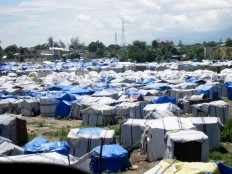|
||||||||||||||||||
|
|
Haiti - Social : 230,000 people still in camps, end 2013 ? 11/02/2013 11:12:25
Selon ces résultats, fournis par la Matrice de suivi des déplacements (DTM) de l’OIM, cela représente une diminution de 3% entre le mois d’octobre 2012 et le mois de janvier 2013, alors qu’entre juin et août la diminution était de 5%. IOM’s latest Displacement Tracking Matrix report shows that between October 2012 and January 2013, the rate of decrease was 3% and 5% between June and August 2012. Despite return and relocation programs implemented by the Government and its humanitarian partners, the decrease is one of the slowest recorded since displaced people began to leave camps in September 2010. This can be partly explained because programs are increasingly under-funded and don’t have the capacity to cover all camps. However, IOM noted a slight increase in the camp population in Croix-des–Bouquets (increase of 103 households), Cité Soleil (increase of 34 households) and Petit-Goâve (increase of 19 households). In Croix-des-Bouquets and Cité Soleil, the increase was due to the arrival of additional households (from other sites and surrounding neighborhoods) in order to benefit from housing assistance programs. The increase in Petit-Goâve was due to the destruction caused by the passage of Sandy. The CCCM Cluster and the Haitian Government through its housing and public buildings unit (Unité de Construction de Logements et des Bâtiments Publics (UCLBP)) estimate that 230,000 people will still be living in camps at the end of 2013 if relocation and return programs are not accelerated. The Government, with the international community’s support, plans to broaden access in 2013 to "return" solutions for those still in camps. To this end, the European Commission Humanitarian Aid Department (ECHO) again intervened with a new contribution of €6 million to a IOM program, that supports the displacement of camp residents to safer housing through rental subsidies. The European Commission Humanitarian Aid Department (ECHO) has now stepped in with a new EUR 6 million contribution to an IOM programme which supports the relocation of camp residents to safer housing options through the provision of rental subsidies. The new ECHO funding will allow IOM to extend the programme until December 2013 targeting at least 7,560 families in some 50 of the highest risk camps in terms of poor sanitation, flooding and landslides. A total of some 36,500 families or 146,000 individuals are expected to have received rental subsidies by the end of 2013. This will reduce the total number of individuals in camps to approximately 50,250 families. "Decommissioning of camps allows the legitimate land owners to get back their plots. Many of them have subsequently started new housing construction in response to increased demand created by return programmes and specifically by the relocations from the camps," says IOM project manager Chiara Milano. The programme also contributes to job creation, as the rental subsidies allow landlords to improve their houses or build additional rooms and improve access to water and sanitation. Beneficiaries also frequently invest the money saved by the rental subsidies in income generating activities and small businesses. Given the large number of families still living in camps and the need to continue to improve the international community’s response to IDPs, a portion of the new ECHO funds will also be allocated to supporting IOM’s Data Management Unit (DTM). HL/ HaitiLibre
|
|
|
Why HaitiLibre ? |
Contact us |
Français
Copyright © 2010 - 2024 Haitilibre.com |



